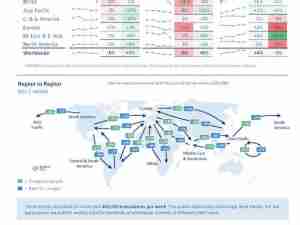The plunge in EasyJet Plc’s borrowing costs this week shows what a difference three days makes.
On Wednesday morning, as the budget airline opened books on a potential 1.2 billion euro ($1.5 billion) offering, its implied yield for seven-year debt was at 1.71%, down a whopping 33 basis points from Monday, before U.K. Prime Minister Boris Johnson outlined the nation’s plan to gradually lift restrictions.
Johnson’s mid-May target for restarting international travel unleashed a wave of pent-up demand from holiday-starved Britons. The surge in summer bookings lifted EasyJet’s shares 18% this week, while discount competitor Wizz Air Holdings Plc was poised for its biggest three-day gain since November.
“It’s great timing for EasyJet, just not so great timing for credit investors,” said Luke Hickmore, an investment director at Aberdeen Standard Investments. “If you wanted to buy airline debt you needed to buy it one month ago at least,” he said.
The sale—which would be the company’s first since 2019—has attracted almost 5 billion euros of investor bids, according to a person familiar with the matter.
The Luton, U.K.-based company narrowed its initial price guidance for the benchmark offering to around 2.125% from 2.375% area, according to the person, who asked not to be named as they aren’t authorized to speak publicly. Before Johnson’s comments on Monday, the BBB- rated carrier’s implied yield on seven-year debt was at 2.04%, according to data compiled by Bloomberg’s BVAL.
“There’s a good chance this deal goes well as there aren’t many investment-grade airlines around,” Hickmore said. “However, I would prefer to think slightly longer-term and buy the winners in the sector that will be outperforming for the next two years, not two weeks.”
EasyJet didn’t immediately reply to a Bloomberg News request for comment. According to a spokeswoman ahead of the sale, the bond program will “further improve our debt maturity profile.”
The offering follows Wizz Air’s deal to pay 1.35% for a 500 million-euro three-year bond in January, and Ryanair Holdings Plc’s five-year offering with a yield of 3% in September.
Despite the surge in optimism, a rebound in global air travel may be off the cards for the next few months, according to Daniel Ender, a fixed-income strategist at ABN Amro Bank NV warned.
“U.K. travel is still down, same with France, Germany and the rest of the largest EU countries,” he said. “Overall, it’s still a long road to pre-Covid levels.”






